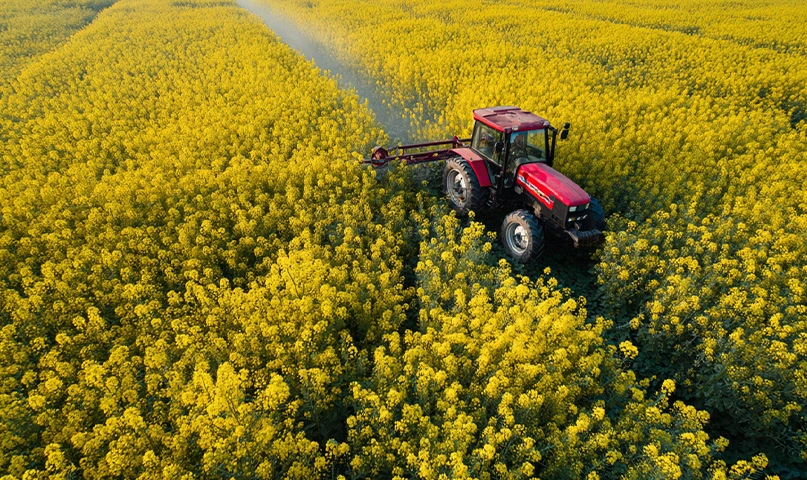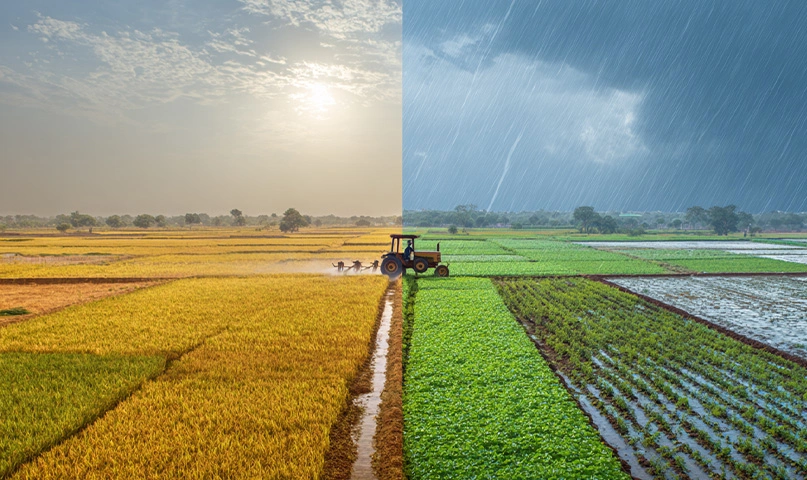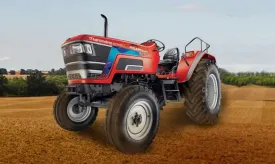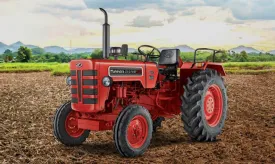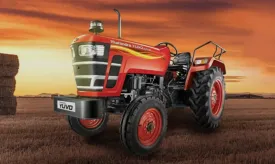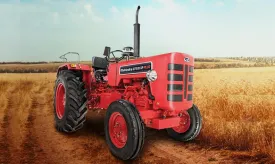Organic Grape Farming in India: Sustainable Vineyard Practices
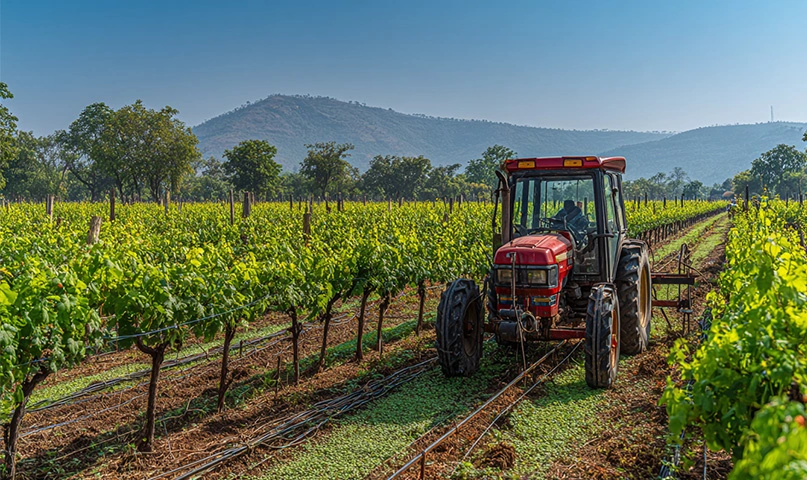
India's agricultural landscape is witnessing a steady shift toward organic and sustainable practices, and grape farming is no exception. With rising consumer demand for chemical-free produce and the potential for export, organic grape cultivation is gaining momentum across major vineyard regions like Maharashtra, Karnataka, and Tamil Nadu. This blog explores how Indian farmers are adopting sustainable practices and modern tools like tractor implements to make organic grape farming both eco-friendly and profitable.
Why Organic Grape Farming?
Grapes are one of India's top horticultural crops, widely grown for table consumption, wine, raisins, and export. However, traditional grape cultivation has often relied on heavy use of chemical fertilizers and pesticides. In contrast, organic grape farming eliminates synthetic inputs, improves soil health, and enhances fruit quality.
Benefits of Organic Grape Farming:
- Higher market price and export potential
- Improved soil fertility and water retention
- Chemical-free, healthier fruit for consumers
- Eligibility for organic certifications (NPOP, USDA Organic)
Key Regions for Organic Grape Cultivation in India
- Maharashtra (Nashik, Sangli): The state contributes over 80% of India's total grape production. Nashik, often called India's “Wine Capital,” leads in organic vineyard adoption.
- Karnataka (Bijapur, Bagalkot): Grape farmers here are turning to organic practices to revive degraded soils.
- Tamil Nadu (Coimbatore, Madurai): Known for table grapes and small-scale organic vineyards.
Sustainable Vineyard Practices for Organic Grapes
Organic grape farming is about more than avoiding chemicals—it's a holistic approach focused on environmental sustainability, biodiversity, and long-term soil health. Here are some essential practices adopted by successful organic vineyards in India:
1. Soil Health Management
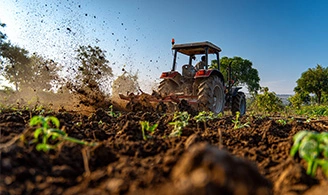
Healthy soil is the foundation of a productive organic vineyard.
- Compost & Farmyard Manure: Rich in nutrients and microbes, these improve soil structure and fertility.
- Green Manuring: Leguminous cover crops like sunhemp or cowpea enrich nitrogen and protect against erosion.
- Biofertilizers: Use of Trichoderma, Azospirillum, and Phosphate Solubilizing Bacteria enhances nutrient availability.
Tractor Implements Used:
- Rotavator: For mixing organic matter into the soil.
- Cultivator: For loosening soil and incorporating green manure crops.
2. Natural Pest & Disease Management
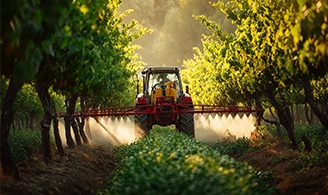
Grapes are susceptible to fungal infections, especially in humid regions. Organic vineyards rely on non-chemical solutions such as:
- Neem Oil & Plant Extracts: Biopesticides to manage aphids, mites, and mealybugs.
- Pheromone Traps: To monitor and reduce insect pest populations.
- Copper and Sulfur Sprays: Allowed in limited quantities under organic standards for fungal disease control.
Tractor Implements Used:
- Boom Sprayer or Mist Blower: For even application of biopesticides across large vineyard areas.
3. Efficient Water Management
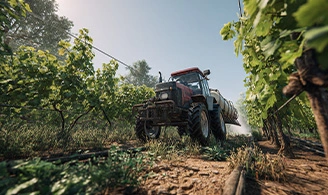
- Drip Irrigation: Minimizes water use while maintaining optimal moisture for vine roots.
- Mulching: Organic mulch (like straw or grape leaves) helps retain soil moisture and suppress weeds.
Tractor Implements Used:
- Mulch Layer: To uniformly spread organic mulch material.
- Water Tanker (Tractor-Towed): Used for supplying water where drip systems aren't installed.
4. Weed Control without Chemicals
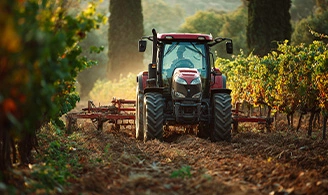
Weed control in organic farming must be mechanical or biological.
- Inter-row Cultivation: Regular tilling keeps weeds in check and promotes root aeration.
- Manual Mulching: Suppresses weed growth naturally.
Tractor Implements Used:
- Inter Row Cultivator: A must-have for vineyard maintenance during the growing season.
5. Canopy and Pruning Management
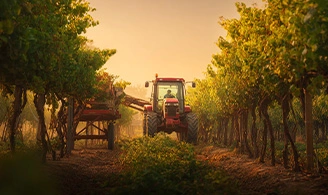
Proper training and pruning help improve grape quality and air circulation, reducing disease risk.
- Canopy Management: Use of trellising systems to support vines and optimize sunlight exposure.
- Seasonal Pruning: Encourages healthy growth and fruiting cycles.
Implements & Tools:
- While pruning is largely manual, tractors can be used to remove pruned material using trolleys or trailers.
Role of Tractor Implements in Organic Grape Cultivation
Though organic farming emphasizes traditional techniques, modern tractor implements play a pivotal role in reducing labour and improving efficiency:
|
Operation |
Recommended Implement |
Benefit |
|
Soil Preparation |
Rotavator, Cultivator |
Enhances compost integration |
|
Weed Management |
Inter Row Cultivator |
Reduces manual weeding efforts |
|
Pest/Disease Spraying |
Boom Sprayer, Mist Blower |
Accurate and uniform biopesticide use |
|
Mulching & Transport |
Mulch Layer, Tractor Trolley |
Moisture retention and input mobility |
|
Harvest Handling |
Tractor with Trolley |
Efficient transport of harvested grapes |
Certification and Market Opportunities
Farmers interested in organic grape farming should pursue certification under bodies like:
- NPOP (National Programme for Organic Production)
- USDA Organic (for exports)
- PGS-India (Participatory Guarantee System for small farmers)
Certified organic grapes fetch 20–40% higher prices, especially in metro cities and export markets like Europe and the Middle East.
Conclusion
Organic grape farming in India is not just a trend—it's a sustainable future. By combining age-old ecological practices with modern tractor implements, farmers can grow high-quality grapes while protecting the environment and improving long-term profitability. Whether you're cultivating table grapes in Nashik or experimenting with wine grapes in Karnataka, going organic is a smart move.
With growing awareness, supportive government schemes, and a maturing organic supply chain, there has never been a better time to embrace organic grape cultivation in India.
Looking to mechanize your organic vineyard?
Explore Mahindra's range of eco-friendly tractor implements and attachments tailored for vineyard operations. Visit your nearest dealership for demos, financing, and guidance on sustainable farming equipment.









